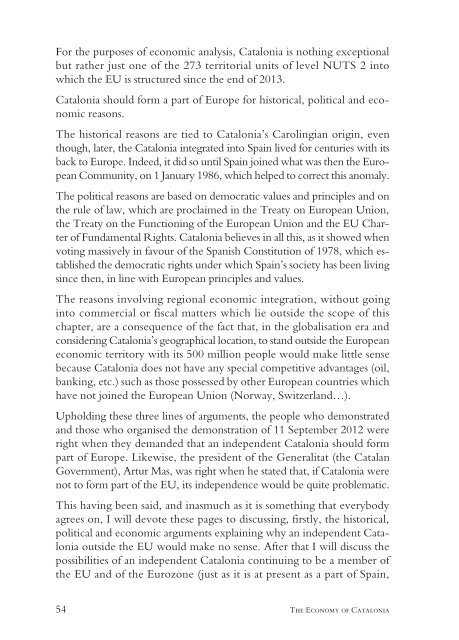The Economy of Catalonia
the_economy_of_catalonia._questions_and_answers_on_the_economic_impact_of_independence
the_economy_of_catalonia._questions_and_answers_on_the_economic_impact_of_independence
Create successful ePaper yourself
Turn your PDF publications into a flip-book with our unique Google optimized e-Paper software.
For the purposes <strong>of</strong> economic analysis, <strong>Catalonia</strong> is nothing exceptional<br />
but rather just one <strong>of</strong> the 273 territorial units <strong>of</strong> level NUTS 2 into<br />
which the EU is structured since the end <strong>of</strong> 2013.<br />
<strong>Catalonia</strong> should form a part <strong>of</strong> Europe for historical, political and economic<br />
reasons.<br />
<strong>The</strong> historical reasons are tied to <strong>Catalonia</strong>’s Carolingian origin, even<br />
though, later, the <strong>Catalonia</strong> integrated into Spain lived for centuries with its<br />
back to Europe. Indeed, it did so until Spain joined what was then the European<br />
Community, on 1 January 1986, which helped to correct this anomaly.<br />
<strong>The</strong> political reasons are based on democratic values and principles and on<br />
the rule <strong>of</strong> law, which are proclaimed in the Treaty on European Union,<br />
the Treaty on the Functioning <strong>of</strong> the European Union and the EU Charter<br />
<strong>of</strong> Fundamental Rights. <strong>Catalonia</strong> believes in all this, as it showed when<br />
voting massively in favour <strong>of</strong> the Spanish Constitution <strong>of</strong> 1978, which established<br />
the democratic rights under which Spain’s society has been living<br />
since then, in line with European principles and values.<br />
<strong>The</strong> reasons involving regional economic integration, without going<br />
into commercial or fiscal matters which lie outside the scope <strong>of</strong> this<br />
chapter, are a consequence <strong>of</strong> the fact that, in the globalisation era and<br />
considering <strong>Catalonia</strong>’s geographical location, to stand outside the European<br />
economic territory with its 500 million people would make little sense<br />
because <strong>Catalonia</strong> does not have any special competitive advantages (oil,<br />
banking, etc.) such as those possessed by other European countries which<br />
have not joined the European Union (Norway, Switzerland…).<br />
Upholding these three lines <strong>of</strong> arguments, the people who demonstrated<br />
and those who organised the demonstration <strong>of</strong> 11 September 2012 were<br />
right when they demanded that an independent <strong>Catalonia</strong> should form<br />
part <strong>of</strong> Europe. Likewise, the president <strong>of</strong> the Generalitat (the Catalan<br />
Government), Artur Mas, was right when he stated that, if <strong>Catalonia</strong> were<br />
not to form part <strong>of</strong> the EU, its independence would be quite problematic.<br />
This having been said, and inasmuch as it is something that everybody<br />
agrees on, I will devote these pages to discussing, firstly, the historical,<br />
political and economic arguments explaining why an independent <strong>Catalonia</strong><br />
outside the EU would make no sense. After that I will discuss the<br />
possibilities <strong>of</strong> an independent <strong>Catalonia</strong> continuing to be a member <strong>of</strong><br />
the EU and <strong>of</strong> the Eurozone (just as it is at present as a part <strong>of</strong> Spain,<br />
54 <strong>The</strong> <strong>Economy</strong> <strong>of</strong> <strong>Catalonia</strong>


